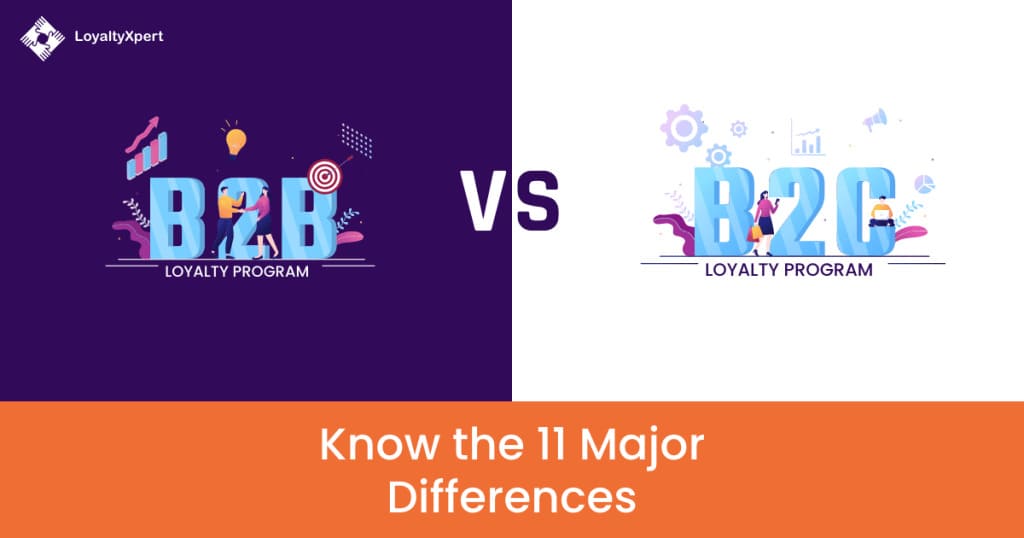When it comes to successful loyalty program management, it is crucial to understand the important differences between B2B and B2C loyalty programs. The former focuses on the retention of other businesses while the latter focuses on the retention of individual customers.
At LoyaltyXpert, we have developed many successful B2B or B2C loyalty programs for a wide range of businesses. In this blog post, we discuss eleven major differences between the B2B loyalty program and the B2C loyalty program.
1. Target market and scale
With fewer numbers of potential clients, the target market for B2B companies is small and focused. With a large number of prospective buyers, the target market for B2C vendors is massive. Apart from the target market, the next difference is the scale. B2B loyalty programs tend to be small in scale, whereas B2C loyalty programs tend to be much larger in scale.
2. Need of buyers
In B2B transactions, the target clients seek experience and expertise. In B2B transactions, the target customers seek deals and entertainment. B2B loyalty programs are less personal and more value-driven. The term means that the programs provide more value to the business clients than appealing to the personal interests of the key decision-makers. On the other hand, B2C loyalty programs are very personal and trigger the emotions of customers.
3. Volume of purchases
Another big difference between B2B transactions and B2C transactions is the volume of purchases. In the former, the volume of purchases is massive as many people in an organization use the products. This results in more frequent purchases that are huge in volume. In the latter, the purchases are small as the customers buy the products or services to use on their own or with their family members.
4. Buying cycle:
B2B companies have a longer buying cycle as they are more planned and focused when it comes to buying a product. As per a study, the B2B buying process is becoming longer and more complex as the majority of buyers are taking a lot of time to research and make business decisions. The companies don’t want to make the wrong purchasing decisions and many want to maintain a long-term relationship with their vendors. In B2C, however, the buying cycle is short as most of the customers take relatively less time on research and evaluation before purchasing the products and services they need. The buying cycle also affects the transaction time. In a B2B loyalty program, transactions take a longer amount of time. In a B2C loyalty program, transactions are faster and take less time.
5. Relationship and communication:
In B2B transactions, the loyalty programs are based on the relationship between vendors and their business clients. For more business and greater opportunities, sellers need to build and maintain strong relationships with their clients. In B2C, products or services are more important for buyers than their relationships with brands. Of course, customer experience plays a big role in ensuring loyalty. But personal rapport is minimal between businesses and customers in B2C transactions. Customers value rewards and benefits more than their relationship with a particular brand. Apart from that, B2B loyalty programs need further communication with buyers compared to B2C loyalty programs.
6. Focus
The focus of B2B loyalty programs differs vastly from that of B2C loyalty programs. In the former, the main focus is on lead generation. Vendors seek to generate more leads by designing attractive programs for their clients. In the latter, the focus is on building brands and ensuring customer loyalty. With the programs, B2C sellers aim to build a strong brand image and make sure that their customers stay loyal and make more purchases.
7. Reward achievement
Businesses have huge purchasing power compared to individual customers. The former outspend the latter by a huge margin. Corporate clients spend much more than individual customers and earn a large number of rewards every year. In B2B loyalty programs, the potential to achieve huge rewards is much higher compared to B2C loyalty programs.
8. Membership
The membership in B2B and B2C loyalty programs are vastly different. In the former, clients must make a purchase or sign a contract to join. In the latter, members join for free and they receive immediate rewards.
9. Offers and rewards:
B2B loyalty programs emphasize on long-term offers. The programs provide rewards that enhance their clients’ business. Some rewards include prize draws, movie experiences, and business consultancy. B2C loyalty programs usually focus on short-term offers. The rewards focus on emotions and personal gratification. Some B2C loyalty rewards include early access, double point campaigns, and discounts.
10. Personalization:
With a smaller client base, B2B loyalty programs are customized for each client. These programs rely on their clients’ experiences and needs for their success. On the other hand, with a wider customer base, B2C loyalty programs offer a limited scope of personalization other than the offers that differ for each segment and relevant email communication.
11. Lead generation:
B2C loyalty programs offer huge scope for generating new leads and collecting valuable customer data as they incentivize target customers to enroll and enter their contact information. B2B loyalty programs, however, provide limited scope for lead generation as the vendors already have their client contact information.
Finally, it may be concluded
Individual customers and business clients are two different target audiences with extremely different wants and needs. Keeping that in the mind, businesses need to devise B2C loyalty programs for individual customers and B2B loyalty programs for corporate clients. At LoyaltyXpert, we have designed many successful B2B and B2C loyalty programs for businesses around the globe. If you want to know which one is the most suitable for your company and how to go about it, look no further. Request a free demo with our team today.

